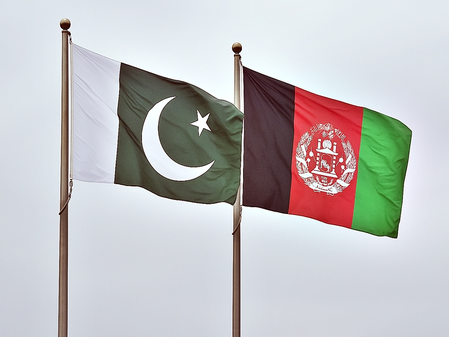New Delhi — Are the deteriorating ties between Pakistan and Afghanistan merely a storm in a teacup? Some voices from Islamabad might suggest so.
In August 2021, just days after the Taliban seized control of Kabul, a photograph went viral showing then–Inter-Services Intelligence (ISI) chief, Lieutenant General (Retd) Faiz Hameed, sipping tea with senior Taliban leaders in the Afghan capital. At the time, Imran Khan was Pakistan’s Prime Minister.
The image quickly became symbolic — seen by some as a diplomatic triumph marking Islamabad’s swift outreach to the new rulers in Kabul, and by others as an impulsive move that would have far-reaching consequences.
Recently, Pakistan’s Deputy Prime Minister and Foreign Minister, Ishaq Dar, pointed to that moment as the beginning of Islamabad’s troubles with the Taliban regime. Addressing the Senate, he remarked that “the cup of tea in Kabul” had proved costly for Pakistan. Defence Minister Khwaja Asif and other ruling party members have echoed this sentiment, describing Hameed’s 2021 visit as a strategic blunder.
What began as a diplomatic gesture has since evolved into a complex ethnic narrative — one that pits Pakistan’s Punjabi-dominated political and military establishment against a largely Pashtun Taliban. Imran Khan’s own Pashtun heritage is now cited by some as evidence of his perceived sympathy for Pashtun militants, further complicating political discourse within Pakistan.
While ethnic dynamics do shape perceptions and political narratives, analysts caution that they cannot fully explain the ongoing rift between Islamabad and Kabul.
Historically, Pakistan’s relationship with Afghan militant groups has been transactional and state-driven. During the Soviet occupation of Afghanistan, the ISI — with support from the CIA — helped organise the Mujahideen. The Taliban and Tehreek-e-Taliban Pakistan (TTP) later emerged as offshoots of those networks.
In the post-Soviet years, Pakistan viewed the Afghan Taliban as a strategic asset to secure influence in Kabul and counter regional rivals. Following 9/11 and the killing of Osama bin Laden on Pakistani soil, Islamabad came under global pressure to sever such links, but continued balancing its engagement with Afghan factions for intelligence and strategic purposes.
The Taliban’s return to power in 2021 reopened old dilemmas: should Pakistan normalise relations and seek cooperation, or use military means to pressure Kabul into restraining anti-Pakistan groups like the TTP and Balochistan Liberation Army (BLA)?
Officials in Islamabad now claim that cross-border attacks and militant movements surged after 2021 — fuelling the perception that Pakistan’s early outreach to the Taliban had backfired.
The once-celebrated photograph of a Pakistani intelligence chief casually having tea with Taliban leaders has since been reinterpreted — no longer as a sign of diplomatic pragmatism, but as the moment Pakistan allegedly lost leverage over Kabul.
For critics of the Imran Khan government, Faiz Hameed’s visit epitomised a hasty decision by elements within the security establishment that prioritised political optics over long-term security planning.
As competing narratives unfold, one portrays the meeting as a misstep that weakened Pakistan’s security position; the other defends it as pragmatic diplomacy that became an easy scapegoat for deeper, systemic issues in the Pakistan-Afghanistan relationship.
With inputs from IANS

